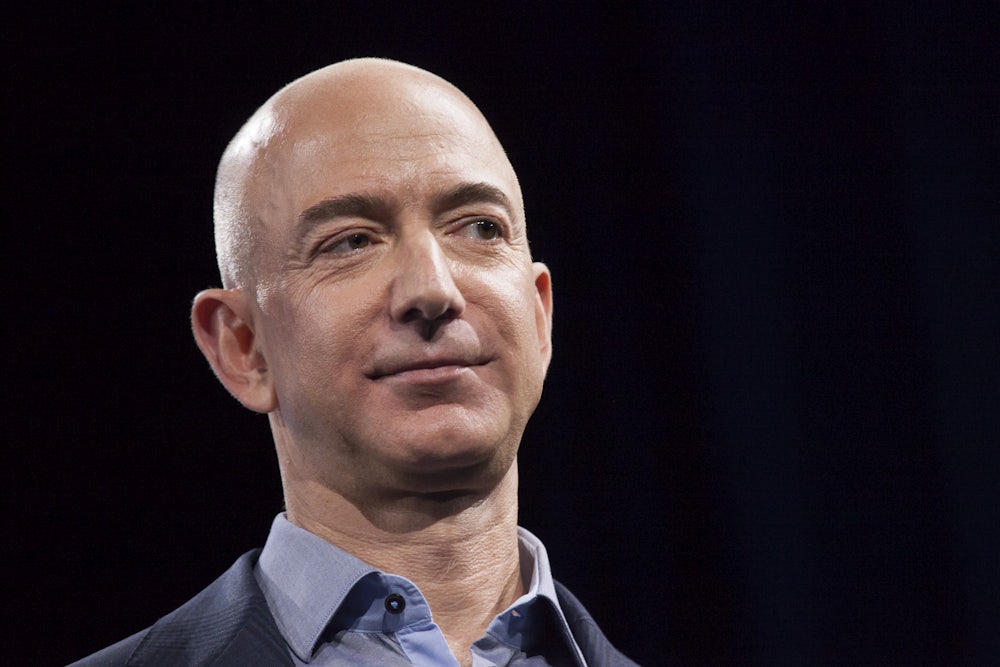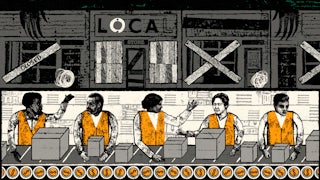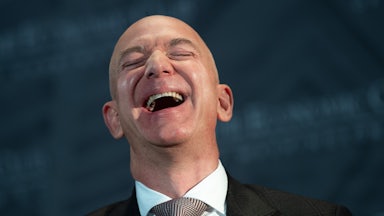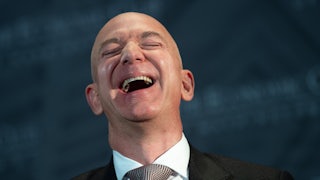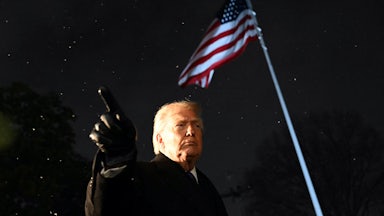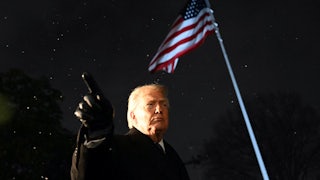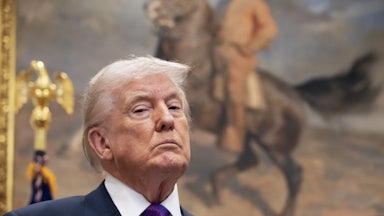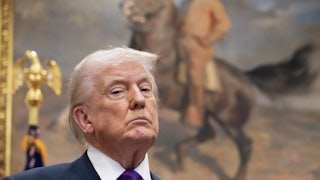Jeff Bezos now owns James Bond. And The Handmaid’s Tale. And Rocky (and Creed). And Legally Blonde, Robocop, The Pink Panther, Silence of the Lambs, and thousands of other films—all of which are also bits of intellectual property that can be made (and remade) into new films.
On Wednesday, Amazon made it official: The e-commerce juggernaut was buying MGM, the venerable studio that was, for much of the twentieth century, synonymous with Hollywood. It is, in one sense, a landmark acquisition: a big tech company acquiring a hallowed, long-in-the-tooth media company. It is also the latest example of Big Tech’s increasing power as its tentacles grope into a variety of sectors, very much including traditional media. Alongside last week’s merger between HBO Max and Discovery, it’s the latest sign that the merger-and-consolidation wave we’re seeing in streaming is only accelerating. Amazon’s new acquisition will certainly inspire another Katamari-like takeover, until the streaming landscape is entirely blotted out by three dominant companies: Netflix, Disney, and Amazon.
There is a lot that Amazon isn’t getting in this deal, despite early reports suggesting otherwise. MGM sold off many of its prize titles—including Gone With the Wind and The Wizard of Oz—years ago. The catalog of titles Amazon acquired mostly includes films released after 1986. Of its big properties, only the James Bond franchise is the sort of blue chip blockbuster for which studios pine. And MGM was already long past its prime: It declared bankruptcy in 2010 and has been managed by its largest shareholder, the hedge fund Anchorage Capital, for most of the last decade. Amazon is paying more than $8 billion for the studio, but a lot of what it is getting is more titles for its ever-expanding streaming library, which it will then use to lure subscribers for its main hustle, its e-commerce platform.
Amazon has achieved a modicum of success by using its clout and capital to purchase film and television prestige for itself, throwing money at directors like Spike Lee, Kenneth Lonergan, and Barry Jenkins, and netting a handful of Oscars in return—most recently for The Sound of Metal. Original hits, on the other hand, have proven harder to come by than award-season trinkets. MGM certainly brings the gauzy memory of gilded old-school studio prestige, but beyond this nostalgia factor, it’s mostly a faded brand. Amazon doesn’t seem all that interested in reviving MGM’s fortunes, as much as it wants to try to aggressively use its back catalog of movies to kindle the wave of blockbusters that have thus far failed to emerge.
This means more reboots and remixes. “The real financial value behind this deal is the treasure trove of IP in the deep catalog that we plan to reimagine and develop together with MGM’s talented team,” Mike Hopkins, senior vice president of Prime Video and Amazon Studios, said in a press release. “It’s very exciting and provides so many opportunities for high-quality storytelling.”
This is the eye-rolling logic dictating so much of Hollywood and tech now. The James Bond franchise retains some of its luster, particularly now that Sam Mendes is no longer associated with it, but the idea of Amazon plowing money into, say, a modern update of The Pink Panther (with Andy Samberg in the Peter Sellers role) only underscores the vacuousness and creative bankruptcy of the IP obsession that guides so much of major filmmaking. (A March 2021 article in Entertainment Weekly previewing the reboot of the Space Jam franchise laid this bare in dystopian fashion, describing LeBron James’s forthcoming adventure as one that would traipse through Warner Brothers’ vast catalog of intellectual property and positing that Casablanca would join the Mad Max and Matrix franchises in one gigantic, unruly “cinematic universe.”)
Bezos’s own creative ideas are similarly shallow—a mix of Joseph Campbell and his own megalomania. Bezos once told Amazon executives that it “can’t be that hard” to make a blockbuster television show, à la Game of Thrones. All you need to do is follow a simple recipe: civilizational stakes, compelling characters, alien invasions. Despite Amazon’s successes making smaller movies like Manchester by the Sea, this kind of hackneyed thinking continues to guide much of its film and television thinking. The network has reportedly sunk nearly half a billion dollars into an upcoming Lord of the Rings television show it hopes will fulfill Bezos’s Thrones-size ambition. (It’s not clear if the final two seasons of Game of Thrones have shifted his thinking.)
For the gentle folks at MGM, here are Jeff Bezos's twelve ingredients for every epic story, from the Hollywood chapter of my book Amazon Unbound. https://t.co/8fFlmzLcOx. Good luck! pic.twitter.com/qlz3EEBfSq
— Brad Stone (@BradStone) May 26, 2021
Amazon will certainly cast itself as a little guy in streaming as it justifies the deal to regulators, who likely won’t care much about the implications of further consolidation, either way—the acquisition has already been greeted with a shrug in most corners. That, too, is a big part of this story. Not long ago, Amazon buying MGM would be considered huge news, a colossal development for both Hollywood and tech. That it’s not—even amid the so-called “techlash” of the last few years—is the latest reminder of just how little has been done to stop the rapid consolidation taking place in Big Tech and media. By the time every on-screen world is just a remixed, vertically integrated appendage of our collective imagination, it may be too late to do anything about it.
